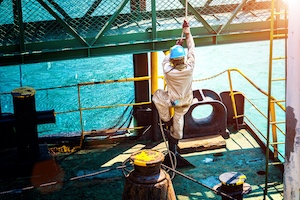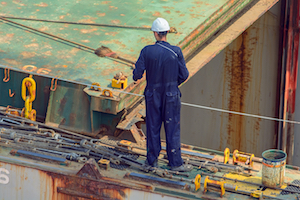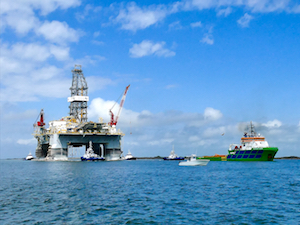Maritime Personal Injury Lawyers Serving Mobile and Surrounding Areas
What Does Maritime Law or Admiralty Law Mean?

This area of law is distinct from state law and applies to events, including injuries, that occur on navigable waters. This could apply to injuries sustained by persons employed at sea, such as seamen and deck hands. Maritime law also applies to persons who are injured by the use of pleasure craft such as jet skis or motorboats. Finally, a form of maritime law also applies to longshoremen and stevedores who are injured in the course of their employment.
Employers have the responsibility to provide a safe environment for its employees who work on the water. Incidents can happen due to unsafe work environments on vessels traveling on the numerous waterways on and around the Gulf Coast. We are personal injury lawyers serving Mobile who have significant experience in the areas of maritime personal injury, including successful representation of catastrophically injured seamen and longshoremen.

If you have sustained a maritime injury while working at sea, you must contact a maritime injury lawyer in Mobile that specializes in the Jones Act. This is how you will be able to recover lost wages and other damages. Our attorneys are also experienced in handling cases involving the Longshore and Harbor Workers’ Compensation Act (LHWCA).
Is There a Difference Between Workers’ Compensation Claims and Jones Act Claims or Longshore Negligence Claims?
There is a big difference between workers compensation cases and maritime injury cases. The Jones Act is a federal law that allows for larger settlements if there is negligence or unseaworthiness involved and you are a seaman. There are also special laws that apply to claims for negligence brought by injured longshoremen. You will want to discuss this with your Offshore Injury Lawyer to ensure you don’t mistakenly file a claim under the wrong law. Maritime law is very complex, so it is best to speak with an experienced lawyer.
Why Should I Hire a Maritime Lawyer?

A maritime injury lawyer can communicate immediately with insurance companies and/or your employer on your behalf. The most important thing to remember if you have sustained an offshore injury is to not sign anything before you ask for legal assistance from an experienced maritime attorney.
You can trust the maritime lawyers at Tobias & Comer Law, LLC for experienced representation if you have been injured in a maritime event. Our attorneys have been successful in many offshore accident and injury cases, including a 2013 barge explosion on the Mobile River where a longshoreman was injured while working on a vessel, a ship yard crane operator who was injured when a vessel toppled his crane, a longshoreman who was crushed by a propeller that dropped while the vessel was in dry dock, and numerous cases involving injury to seamen.
Contact us for a free initial consultation if you are a loved one has been injured or killed working as a seaman, a longshoreman, or as a passenger on a transport vessel.
The Gulf Coast, with its busy ports and network of waterways, is no stranger to maritime activity. Mobile, in particular, is a hub for maritime trade and fishing, making it a region with a higher likelihood of maritime accidents.
If you’ve been injured in an incident on the water, it is essential to understand the different types of maritime incidents and your rights. The team at Tobias Comer Law has 70 years of combined experience protecting the rights of the Alabama community.
Types of Maritime Accidents
Vessel Collisions
When two vessels collide, the impact can be devastating. These collisions can occur due to poor weather conditions, equipment failure, or human error. The aftermath often includes serious injuries or fatalities, significant property damage, and environmental disasters.
Allisions
An allision differs from a collision as it involves a vessel striking a stationary object, such as a dock or a bridge. These incidents frequently result from navigation errors or mechanical issues and can lead to substantial harm to both property and crew.
Groundings
Grounding happens when a vessel runs ashore or hits the bottom of the water body, often due to navigational mistakes. Such accidents can lead to hull breaches, oil spills, and even sinking.
Onboard Accidents
Slips, trips, and falls are common on vessels, especially on decks that become slippery due to weather conditions or spills. These can cause significant injuries, including broken bones or head trauma.
Offshore Drilling Incidents
The Gulf Coast is dotted with offshore drilling rigs. Accidents here can include blowouts, explosions, and fires, often resulting in severe injuries and environmental damage.
Fishing Vessel Accidents
The fishing industry is notorious for its hazards. Accidents on fishing vessels can range from equipment malfunctions to vessel capsizing, often due to overloading or instability.
What to Do After a Maritime Accident
If you are involved in a maritime accident, there are critical steps you should follow:
- Seek Medical Attention: Your health is paramount. Even if you don’t feel injured, some conditions may not present symptoms immediately.
- Report the Incident: Notify the Coast Guard and your employer. Reporting is not just a legal requirement; it also documents the event for future claims.
- Document Everything: Take photographs, collect the contact information of witnesses, and keep a record of everything related to the accident and your injuries.
- Preserve Evidence: Do not dispose of anything that could be used as evidence. This includes personal belongings that were damaged and any equipment involved in the incident.
- Consult a Maritime Attorney: Maritime law is complex, and having an expert on your side is crucial. Our experienced maritime attorneys can guide you through the legal process to ensure your rights are protected.
Legal Considerations
Under maritime law, injured workers may be entitled to maintenance and cure, which covers medical treatment and a daily living allowance. Additionally, the Jones Act provides protections for seamen, allowing them to sue their employers for negligence.
Victims of maritime accidents can also seek compensation under the doctrine of unseaworthiness, which holds vessel owners accountable for accidents resulting from unsafe conditions on their ships.
Why You Should Choose Our Maritime Injury Attorneys
At Tobias Comer Law, we have a deep understanding of the intricacies of maritime law. Our team can help you navigate the complexities of maritime injury claims and will fight tirelessly to secure the compensation you deserve.
We have a proven track record of advocating for maritime workers, passengers, and their families affected by maritime accidents. Our attorneys are well-versed in both state and federal maritime regulations and have the expertise to handle cases involving the Jones Act, the Longshore and Harbor Workers’ Compensation Act, and other relevant statutes.
Contact Our Maritime Injury Team Today
If you or a loved one has been involved in a maritime accident, you don’t have to navigate these troubled waters alone. Contact our maritime injury attorneys today to schedule a no-obligation consultation.
We will review your case, provide you with your legal options, and offer the support and guidance you need during this challenging time. At Tobias Comer Law, there’s no fee until we recover for you, so schedule your no-risk consultation today!
Related Videos
- Summer Safety | National Boating Safety Week |Tobias & Comer Law
- What to do in a Marine Patrol Stop | Tobias & Comer Law
- You Are Responsible for Your Wake | Boating Safety | Tobias & Comer Law
- What Type of Life Jackets Do I Need? | Tobias & Comer Law
- BUI and Boater Fatigue
- File a Float Plan | Tobias & Comer Law
- Do You Have to Wear a Life Jacket on a PaddleBoard? | Tobias & Comer Law
- Life Jacket Safety and Serviceability | Tobias & Comer Law
- Accidents on the Water | Boating Safety | Tobias & Comer Law
- Accidents on the water – What is Maritime Law?
- Maritime Law and Injuries on the Water
- Accidents on the Water: Your Questions Answered
- Understanding Maritime Law




